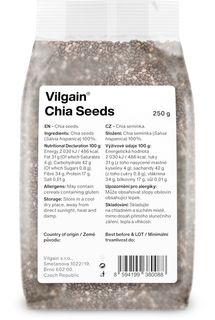What are chia seeds?
Chia seeds are the tiny white‑brown‑black fruits of the Hispanic sage, which are classified as one of the so‑called "chia seeds" due to their high content of health benefits. Superfoods. The benefits of the seeds were already known to the Mesoamerican Maya, in whose language the word "chia" was used to refer to strength.
Chia seeds are rich in fibre, antioxidants, minerals and are considered to be the richest plant source of omega‑3 fatty acids, which, however, are not as high quality as the omega‑3s found in fish oil. The seeds bind water well and form a gel‑like consistency.
Effects of chia seeds
Chia seeds are most commonly associated with positive effects on weight loss, especially due to their high fibre and protein content, which are highly satiating and reduce appetite. Even so, chia seeds should not replace a normal and varied diet, but their inclusion can contribute to a balanced diet when trying to lose weight.
Eating chia seeds can contribute to bone and dental health (especially due to their high calcium and phosphorus content), reduce blood sugar levels or the risk of heart disease.
How to include chia seeds in your diet?
Chia pudding is probably the most popular way to consume chia seeds. However, their bland flavour makes them versatile - they can be added to porridges, puddings, yoghurts, smoothies, salads, in baking or rice preparation. It is not only among vegans that the use of chia seeds (or flaxseeds) in place of eggs in baking and cooking has become widespread.
Due to its high fibre content, it is recommended to consume a maximum of 25‑30 g of chia seeds per day (approximately 2 tablespoons). Higher doses may cause digestive problems.
